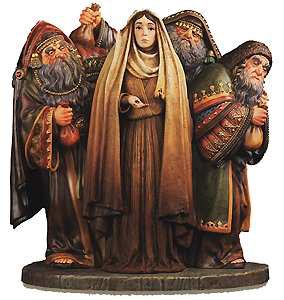
Widow’s Offering
Christ’s Condemnation of Religion
The Gospels contain one of the most misunderstood observations of Christ that has great application to us today and I am referring to the Widow’s Offering at the Temple (Mk 12:41-44; Lk 21:1-4).
The has traditionally been taught that Jesus is praising the woman for her generous giving which was greater in proportion to the wealth others were giving to the Temple (Wikipedia). I held this same opinion also because I believed what I was told and not what was on the page! I am indebted to Dr. McArthur for his illuminating insight into this passage. When we carefully look at the context we will find a much different lesson that is very applicable to us today.
This observation of the widow’s offering does not occur in a vacuüm; however, when people approach the Scriptures they tend to read their selected passages without context. If you read just the selected passages you will arrive at believe that He is praising the widow for her giving. However, once you place this passage in the context of the preceding and succeeding passages and within the context of both Jesus’ overall message about Judaism of His day and the even wider context of the Mosaic Law – you will arrive at a very different conclusion. Unfortunately, the conclusion we usually arrive at tells more about our current worldview than it does about the truth of the Scripture.
Yes, the wealthy were giving to the Temple and yes, they were not giving everything they owned, this is clearly stated. Yes, the widow gave two coins which was all she had. Yes, Christ contrasted her giving with the giving of the wealthy. However, where does it say in the passages that Christ “praised” her for her giving? You have heard this from the pulpit throughout the Church Age because they have a vested interest in promoting giving. But this is NOT in the passage!
The preceding Scriptures depict Christ’s condemnation upon the Sadducees and Scribes. The succeeding passages depict Christ’s condemnation on the Temple and its later destruction. Neither Mark nor Luke would have placed a passage of praise to the Temple in the midst of these condemnations since it disrupts and weakens the message of Christ’s rejection by the religionists of His day. Rather, these two authors were illustrating the ravages of this false religious system upon those who were most in need of hope.
The Law required a believer to give a tithe, 10% of one’s earnings. There is no place where the Law demands that people give everything to the Temple and even voluntary offerings were given after one provided for one’s self and family. Think about this woman who is in abject poverty and has obtain two coins that could give her some nourishment. She would have been dressed in rags, dirty, probably diseased, and smell because she did not have the means to be anything else (Think homeless). She gives her only two coins so she can go starve. Bible says she gave everything. She has nothing to left for eating, or shelter. Why did she do this?
This is the power of religion, but not the demands of the Gospel. Religion says everything you have is mine for my growth; nothing is more important than the growth of religion and its accoutrements. Christ pounded this message in page after page of the Gospels, it is one of the reasons the Sadducees, Pharisees and Scribes wanted him dead. He was exposing their exploitation of the people, especially the poor, for their own gain. This perverted the true Gospel, robed people of the hope they were supposed to receive from the Temple and the many teachers of “righteousness”. Instead, they received demands, weighty commands, rules, and every trip to the temple cost money for offerings and sacrifices. They would have put a television preacher to shame in their demands for more and more money. This woman illustrated the slavery of pitiless religion. She was in need of salvation but she was not looking for salvation. She sought her salvation from religion and for her pains she received the recompense of religion – slavery.
Notice, Christ did not draw a parallel between the wealthy and the widow other than to observe that they gave to this pitiless religion out of their abundance. They did not yet realize their poverty of grace. This was His opportunity to condemn the wealthy while praising the poor; yet, He did not. Many put these words in His mouth but this is not what He said. Our eisegetical {reading into Scripture} interpretations illustrate our prejudices that decide what we “think” Scriptures are teaching. Thus, we are not learning from Scriptures but reading our beliefs into Scriptures justifying ourselves. This is especially true of political economics in America such as the minimum wage and our view of poverty.
Keynesian economics (government spending produces wealth) promotes the idea that giving people more paper dollars will cut their poverty {which is an artificial, constantly changing designation promotes a political agenda of servile slavery just like religion}. The problem is that the government does not produce wealth {money}. It must take the money from someone to give to others. The money the government takes removes these funds from the economy reducing society’s ability to produce wealth in the form of jobs, homes, products, etc. Raising the “minimum wage” {another constantly changing artificial definition not tied to wealth} benefits only those who now have jobs while denying jobs to those who are seeking work; thus, it actually produces poverty. The true goal of the minimum wage is NOT to end poverty but to CONTINUE poverty. Those who are defined, by the government, as impoverished will receive “assistance” from the government {that requires they drop any means of wealth production or lose benefits}. This ever-growing percentage of the populace then votes for those who promise to continue this practice hoping to receive enough money to live like those who learned a trade, found work and attempt to provide for the future of their children {whom the government calls selfish for wanting to follow the pathway outlined in Austrian economics and American history}.
Thus, government is the religion of the masses {the true aim of Marx} and produces the same result: heavier burdens, more laws, more rules, more taxes, and NO hope, unless you are either of the ruling élite or embedded in “crony capitalism” {you pay your dues to keep the government and competition at bay}. The means to change this system is probably beyond us as ALL Americans seek to elect people who are enmeshed in this destructive system of economics which “empowers” them while impoverishing those they claim to protect. I will leave you with an image that best illustrates what this system actually looks like. It is an ancient symbol that represents Satan, man and false knowledge. It pretends to give wisdom when actually it robs people of hope both in this life and the next unless people search for the true Gospel of salvation in Christ.

